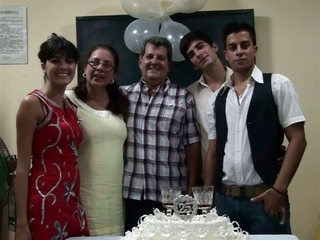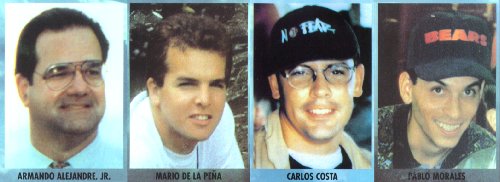AMNESTY INTERNATIONAL ASSESSMENT OF STATES’ IMPLEMENTATION OF
RECOMMENDATIONS FROM THE PREVIOUS UPR
16TH SESSION OF THE UPR WORKING GROUP, 22 APRIL - 3 MAY 2013
INTRODUCTION
In its submissions for the UPR, Amnesty International endeavours to assess the level of
implementation of some of the recommendations, made by other states in the previous UPR cycle, that the organization considers to be of the greatest importance in terms of improving the human rights situation in the countries reviewed. The information in this document is drawn from the submissions made by Amnesty International for the 16th session of the UPR Working Group on the following countries: Azerbaijan, Cameroon, Canada, Colombia, Cuba, Germany, Russian Federation, Turkmenistan, and Uzbekistan.
The UPR modalities stipulate that, from the second cycle onwards, the reviews should focus, inter alia, on the implementation of the preceding review outcome.1 Amnesty International considers that this aspect of the UPR is crucial if the UPR is to fulfill its key objective of improving the human rights situation on the ground. Amnesty International urges all states participating in the UPR to raise the issue of implementation of previous recommendations during the interactive debate in the UPR Working Group, including exploring obstacles to implementation and options for cooperation and sharing of good practice in the respective area.
[...]
CUBA
At the time of its first Universal Periodic Review in February 2009, Cuba accepted 60 recommendations of the 89 commendations made to it by other States.27 Most of the recommendations accepted by Cuba concerned economic and social rights policies that had already been implemented.28 However, Cuba also accepted several recommendations on issues that Amnesty International believes are key to improving the human rights situation in the country, including as regards the promotion and protection of human rights and freedoms,29 the death penalty,30 cooperation with UN human rights mechanisms,31 and the Standard Minimum Rules for the Treatment of Prisoners.32
Promotion and protection of human rights
With respect to advancing the promotion and protection of human rights, Amnesty International notes that Cuba’s repressive legal framework - limiting the rights to freedom of expression, association, assembly and movement - remains unchanged.
Cuba has also yet to ratify the International Covenant on Civil and Political Rights and the International Covenant on Economic, Social and Cultural Rights, both of which Cuba signed in February 2008. At the time of the Human Rights Council’s adoption of the outcome of Cuba’s first review, Cuba noted that it needed sufficient time to assess the provisions of the Covenants and its own political and judicial system to ensure their compatibility.33
In practice, Amnesty International has noted that respect for fundamental human rights has not progressed in Cuba since its first review. In fact, during this period, repression of the peaceful exercise of civil and political rights has increased. Independent journalists, human rights activists and political opponents have often been harassed by state security services, and some have been detained and sentenced. Moreover, there has been a steady increase in the number of arbitrary detentions since 2009.
Abolition of the death penalty
During its first review, Cuba accepted a recommendation to refrain from applying the death penalty, and took under consideration a recommendation to reduce the number of criminal offences punishable by the death penalty, or to take measures towards its abolition.34 In setting out its view on the recommendations taken under consideration, Cuba noted that it was “philosophically” against the punishment and in favour of “eliminating [the death penalty] when conditions are right”. However, Cuba also stated that it needed to maintain the death penalty in its legislation in order to defend its national security against terrorist attacks.35
In 2010, the People’s Supreme Court commuted the death sentences of the last two political prisoners on death row.36 At the time of this writing, Amnesty International believes that no prisoners are on death row.
Cooperation with UN special procedures and treaty bodies
Regarding the recommendation supported by Cuba to strengthen its cooperation with UN Special Procedures and treaty bodies, Amnesty International acknowledges Cuba’s efforts to submit periodic reports to the treaty bodies.37 However, Cuba has shown no commitment to working with UN Special Procedures; a visit of the Special Rapporteur on torture was agreed in 2009, but has not yet gone ahead. So far, Cuba has failed to issue an invitation to the Special Rapporteur on freedom of association and assembly, who requested to visit in 2003 and again in 2011, or to the Special Rapporteur on freedom of religion, who requested to visit in 2006.
Application of the standard minimum rules for the treatment of prisoners
Amnesty International receives regular reports that could indicate a breach of the Standard
Minimum Rules for the Treatment of Prisoners, including ill-treatment of common and political prisoners. The organization has concerns based on interviews with former prisoners of conscience who were released between 2009 and 2011; however, it is unable to verify the validity of current reports first hand. For this reason, Amnesty International believes that it is paramount that Cuba allows the Special Rapporteur on torture to visit the country and have unrestricted access to the prison population.
Shortcomings in Cuba’s first universal periodic review
In Amnesty International’s view, Cuba’s first review in February 2009 was highly politicized and resulted in a weak review of Cuba’s human rights record. With few exceptions, most of the recommendations made by other states did not address the human rights situation in Cuba.
Amnesty International also regrets that Cuba rejected some of the recommendations by claiming that existing national institutions and legislation offer full protection of human rights and do not require further change. On these grounds, Cuba rejected the need to establish a national human rights institution in accordance with the Paris Principles38 and refused to ratify the Optional Protocol to the Convention against Torture.39 Cuba also rejected a recommendation to provide full access to the International Committee of the Red Cross to prisons,40 and to establish a system of review of its prisons by the UN and other international observers.41
Footnotes
1 Human Rights Council resolution 5/1, Institution-building of the United Nations Human Rights Council, Annex, paragraph
[...]
27 Human Rights Council, Report of the Human Rights Council on its eleventh session, A/HRC/11/37, 16 October 2009, paragraph 410 (A/HRC/11/37).
28 Several recommendations called on Cuba to extend its solidarity programmes or share its experience on promoting the right to health and education. Although Amnesty International acknowledges Cuba’s international cooperation programmes in promoting access to health and education in developing countries, the organization does not monitor Cuba’s solidarity programmes or to what extent its knowledge-base on health and education has been shared with other states, and therefore cannot comment on whether these recommendations have been implemented.
29 Human Rights Council, Report of the Working Group on the Universal Periodic review on Cuba, A/HRC/11/22, 29 May 2009, recommendation 130.4 (Jamaica), (A/HRC/11/22).
30 A/HRC/11/22, recommendation 130.42 (Brazil).
31 A/HRC/11/22, recommendations 130.34 (Brazil) and 130.37 (Chile).
32 A/HRC/11/22, recommendation 130.45 (The Netherlands).
33 Human Rights Council, Informe del Grupo de Trabajo sobre el Examen Periódico Universal, Adición, A/HRC/11/22, 29 May 2009, Add.1, page 2 (A/HRC/11/22).
34 A/HRC/11/22. Cuba accepted recommendation 130.42 (Brazil), and took under consideration recommendation 131.13 (Italy).
35 Human Rights Council. Report of the Working Group on the Universal Periodic Review of Cuba – Addendum. A/HRC/11/22/Add.1, 29 May 2009, page 10 (A/HRC/11/22/Add.1).
36 In December 2010, the People’s Supreme Court commuted the death sentences of Salvadoran nationals Raúl Ernesto Cruz León and Otto René Rodríguez Llerena to 30 years in prison. They were both convicted of terrorism charges in 1999. On 28 December, Humberto Eladio Real Suárez, a Cuban national sentenced to death in 1996 for the killing of a police officer in 1994, had his sentence commuted to 30 years in prison.
37 At the time of writing, Cuba has overdue reports only on the Optional Protocol to the Convention on the Rights of the Child on the sale of children, child prostitution and child pornography, and the initial report to the Committee on the Rights of Persons with Disabilities (overdue since June 2010).
38 A/HRC/11/22/Add.1, paragraph 6.
39 A/HRC/11/22/Add.1, paragraph 3.
40 A/HRC/11/22/Add.1, paragraph 10.
41 A/HRC/11/22/Add.1, paragraph 14.
http://www.amnesty.org/en/library/asset/IOR41/002/2013/en/0b7851c2-57ab-4ffe-8e09-cea3cb813f5a/ior410022013en.pdf

















